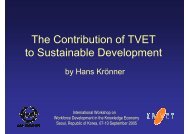Learning for Life, Work and the Future Initial ... - Unesco-Unevoc
Learning for Life, Work and the Future Initial ... - Unesco-Unevoc
Learning for Life, Work and the Future Initial ... - Unesco-Unevoc
You also want an ePaper? Increase the reach of your titles
YUMPU automatically turns print PDFs into web optimized ePapers that Google loves.
<strong>Learning</strong> <strong>for</strong> <strong>Life</strong>, <strong>Work</strong> <strong>and</strong> <strong>the</strong> <strong>Future</strong> Participants’ Papers Page 83<br />
• Co-operation with o<strong>the</strong>r parties such as donors,<br />
churches <strong>and</strong> NGOs, <strong>and</strong> through partnership with<br />
existing trainers<br />
• No residential training to reduce costs. Training to<br />
be brought to <strong>the</strong> people through <strong>the</strong> establishment<br />
of two VTCs per province <strong>and</strong> at least one per<br />
town, with two each <strong>for</strong> Chitungwiza, Harare <strong>and</strong><br />
Bulawayo<br />
• Community-oriented curricula, dem<strong>and</strong>-driven<br />
short <strong>and</strong> long courses<br />
• Democratisation of training: open entry with<br />
literacy <strong>and</strong> numeracy as <strong>the</strong> criteria <strong>for</strong> selection<br />
• Entrepreneurial skills a requirement<br />
• Establishment of VTCs to be spearheaded by parent<br />
colleges already in existence<br />
• Lecturers to emphasize practical skills acquisition.<br />
In Zimbabwe, <strong>the</strong> establishment of VTCs was jumpstarted<br />
with funding from UNESCO <strong>for</strong> intensive skills<br />
training <strong>for</strong> self-employment in Bulawayo <strong>and</strong> Gokwe.<br />
The author was involved in spearheading this project in<br />
Bulawayo. O<strong>the</strong>r funds to run <strong>the</strong> VTCs came from<br />
<strong>the</strong> Zimbabwe Manpower Development Fund,<br />
ZIMDEF. The project has achieved some measurable<br />
success in dissuading school-leavers from roaming <strong>the</strong><br />
streets or crossing borders to seek jobs <strong>the</strong>re.<br />
The new approach to training, <strong>the</strong> Zimbabwe Self-<br />
Employment Skills Training Model (ZSSM) designed<br />
by St. Raza, is given below.<br />
(1) Pre-Training – Product/Service Identification<br />
<strong>and</strong> Selection<br />
• Business opportunity guidance<br />
• Market survey<br />
• Industrial attachment<br />
(2) Training – Technical Skills Acquisition Based on<br />
Identified Opportunity<br />
• Entrepreneurial skills acquisition in Awareness of<br />
Entrepreneurship, Achievement Motivation, Entrepreneurial<br />
Skills <strong>and</strong> Management Training <strong>and</strong> a<br />
Survey of Industrial Environment.<br />
(3) Post-Training Support Services<br />
• Attachment of students/graduates to Production<br />
Units of <strong>the</strong> college to imitate real-life self-employment,<br />
raise start-up capital <strong>and</strong> create confidence<br />
<strong>and</strong> experience in <strong>the</strong> venture whilst under <strong>the</strong><br />
guidance of lecturers<br />
• Establish backyard business<br />
• Self-employment in factory shells<br />
• Creation of Graduate Self-employment Support<br />
Systems (GSSS), giving:<br />
• Technical support <strong>and</strong> follow-up by lecturers<br />
<strong>and</strong> industrial experts to ensure technical<br />
viability.<br />
• Managerial follow-up by lecturers <strong>and</strong> industrialists<br />
to ensure managerial <strong>and</strong> financial<br />
viability.<br />
• Infrastructural support – Local Authority to<br />
ensure creation of factory shells, l<strong>and</strong> <strong>and</strong><br />
building support at affirmative action rates.<br />
• Financial support from NGOs, micro-finance<br />
houses <strong>and</strong> banks to be solicited.<br />
Committees representing <strong>the</strong>se four areas need to be<br />
set up to offer support <strong>and</strong>/or follow-up.<br />
6. Proposed Method of Establishing VTCs<br />
• Identification of existing facilities through local<br />
authorities.<br />
• Inspection of <strong>the</strong> infrastructure by experts.<br />
• Conduct of needs analysis to determine dem<strong>and</strong>driven<br />
courses required by community.<br />
• Determination of venues <strong>for</strong> <strong>the</strong> courses.<br />
• Appointment of lecturers based on <strong>the</strong> courses in<br />
dem<strong>and</strong>.<br />
• Enrolment of students based on identified<br />
opportunities in <strong>the</strong> market.<br />
• Order <strong>and</strong> purchase of appropriate consumables <strong>and</strong><br />
of basic machinery that cannot be made by <strong>the</strong><br />
students <strong>the</strong>mselves.<br />
• Start of training based on identified opportunities<br />
<strong>and</strong> entrepreneurial skills.<br />
• Offer of post-training support to ensure selfemployment.<br />
Grierson (1997) concurs with his three stages:<br />
Selection, Training <strong>and</strong> Self-Employment.<br />
7. Conclusion<br />
The author feels that <strong>the</strong> use of VTCs as a way of<br />
reducing unemployment can be adopted by SADC<br />
member states in addition to <strong>the</strong> conventional training<br />
methods of institutional, apprenticeship <strong>and</strong> skills<br />
upgrading.<br />
John Grierson, in Small Enterprise Development Vol.<br />
11 No. 3 (Sept 2000), recognised that training <strong>for</strong> selfemployment<br />
should not be mistaken <strong>for</strong> vocational<br />
training in general. One cannot expect that once technical<br />
skills have been acquired, self-employment will<br />
automatically ensue. The Zimbabwe situation is witness<br />
to this. Although many are graduating from technical<br />
colleges, <strong>the</strong>y still go back to <strong>the</strong> streets <strong>for</strong> lack<br />
of employment. We now need not just skills <strong>for</strong> wage-





